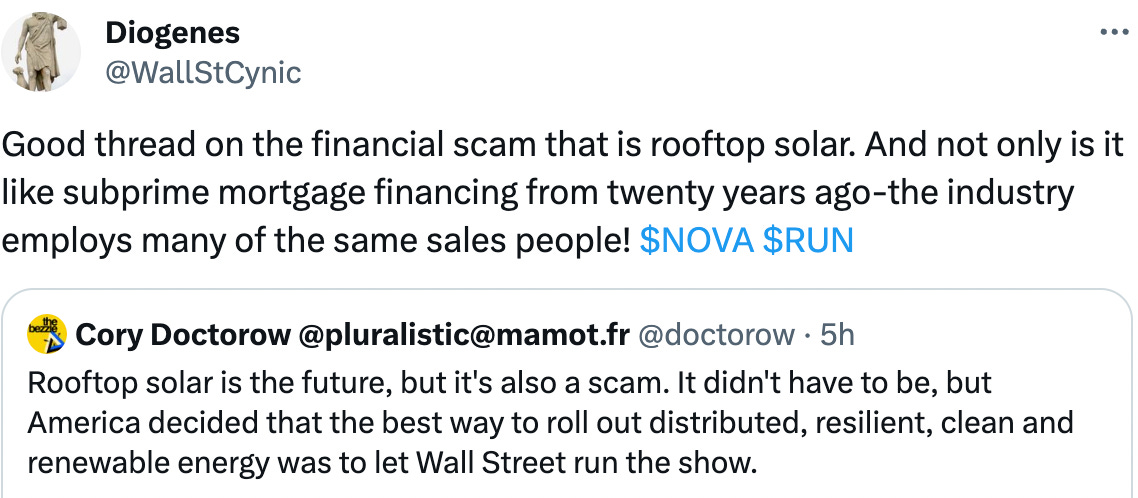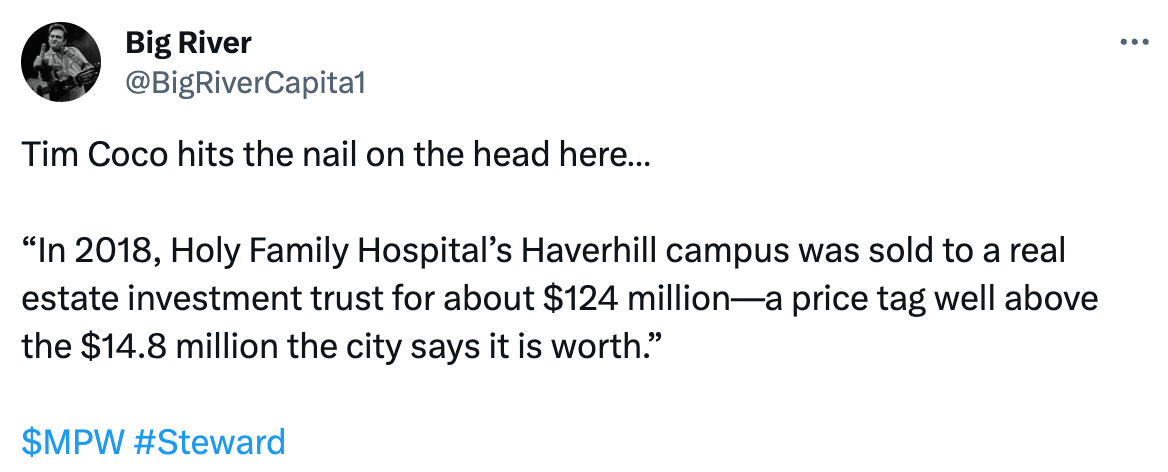Welcome to The Bear Cave! Our last premium articles were “Problems at Chegg (CHGG)” and “Problems at a $6 Billion+ Recent Tech IPO” and our next premium investigation comes out this Thursday, February 1.
New Activist Reports
NINGI Research published on Svenska Cellulosa (Stockholm: SCA — SEK 97.0 billion), a Swedish timber, pulp, and paper company. NINGI alleged that “the company’s financial statements are materially misstated and SCA didn’t consolidate at least SEK 3.6 billion of debt from commercial paper and credit facilities.” NINGI also noted that the company has had three different general counsels in the last three years and the company’s prior CFO resigned before the company’s 2021 annual filings and was replaced by a 36-year-old. In addition, NINGI highlighted that “two of the three audit committee members don’t own a single share of SCA” and alleged that some board members are “not acting in the interests of all shareholders, but solely in their own interests.”
Viceroy Research also independently published on Svenska Cellulosa in a report titled “Fudging Your Lumbers” and said that “[the company’s] valuation methodology has relied on short-term price fluctuations, interest rate fluctuations, & mark-to-market assumptions for numerous unrealistic inputs to massively inflate SCA’s forestry assets.” Viceroy also alleged the company was overharvesting its forest, harvesting underage timber, and concluded,
“Viceroy’s investigation is ongoing, and we anticipate producing further SCA reports, as well as a review of SCA’s 2023 results, in the near term.”
Snowcap Research published on Diversified Energy Company PLC (NYSE: DEC -- $596 million), “the single largest owner of oil and gas wells in the US.” Snow Cap alleged that “decline rates appear higher than reported, dividends are not sustainable, and [Asset Retirement Liabilities] may be significantly under-funded.”
Recent Resignations
Notable executive departures disclosed in the past week include:
CFO of Archer-Daniels-Midland (NYSE: ADM — $27.8 billion) was “placed on administrative leave, effective immediately” after a little less than two years. The “leave is pending an ongoing investigation being conducted by outside counsel for the company and the Board's Audit Committee regarding certain accounting practices and procedures with respect to the company's Nutrition reporting segment, including as related to certain intersegment transactions.” The company also disclosed that “the investigation was initiated in response to the company's receipt of a voluntary document request by the Securities and Exchange Commission… The company is cooperating with the SEC.”
Kenneth S. Booth, who has served as dual CEO and CFO of Credit Acceptance Corp (NASDAQ: CACC — $6.92 billion) for the last two years and CFO for a total of 19 years, “ceased to serve as the company's principal financial officer” and instead will only serve as CEO. The company is audited by Grant Thornton LLP and overseen by a six-person board.
Chief Medical Officer of Zentalis Pharmaceuticals (NASDAQ: ZNTL — $897 million) “stepped down for personal reasons” after a little over one year. In October, the company’s Chief Operating Officer departed after just eight months and the company’s Chief Scientific Officer, who previously served as the company’s Chief Operating Officer, also resigned last month. The company is down ~45% since its April 2020 IPO.
Chief Legal Officer of Mercury Systems (NASDAQ: MRCY — $1.81 billion) departed after seven and a half years. The company’s Chief Growth Officer and Vice President of Mission Systems both departed in the last two months and the company has had two different CEOs, three different CFOs, and three different Chairmen in the last three years. In July 2022, GlassHouse Research called Mercury Systems “a deteriorating roll-up that is set to implode” and alleged the company prematurely recognized revenue among other alleged accounting issues.
Data for this section is provided by VerityData from VerityPlatform.com
What to Read
“They Thought Their Money Was in High-Interest Accounts—They Got Paid Peanuts” (WSJ)
“The issue dates back to a little-noticed change Capital One made in the era of low rates. In 2019, the lender introduced a new savings account called 360 Performance Savings. Existing customers were kept in older accounts that had a similar name, 360 Savings, which the bank previously advertised as having ‘a great rate’ but has since closed to new customers. When the Fed started its rate increases, Capital One only raised rates on 360 Performance Savings accounts.”
“Value Investing’s Renaissance Man” (Raging Capital Ventures)
“The one thing that I’ve noticed is that, if you’re looking in the $50 million to $200 million market cap range, there’s tons of people out there researching those stocks. You’ll have some dinky stock that you think is obscure, yet everyone is looking at it. Then you’ll find an $800 million company that literally feels like no one is looking at it with a critical eye. And so, I don’t know about systematic areas to look.”
“Statement on Final Rules Regarding Special Purpose Acquisition Companies (SPACs), Shell Companies, and Projections” (SEC)
“The final rules make SPACs accountable for their forward-looking statements. Investors are harmed when parties engaged in a de-SPAC transaction over-promise future results regarding the target company. Accordingly, today’s final rules will remove safe harbor protections and add additional disclosure requirements for projections used in association with de-SPAC transactions.”
Tweets of the Week
Until Thursday,
The Bear Cave









